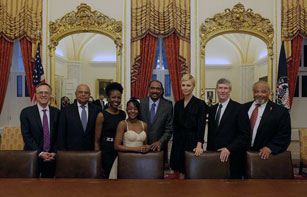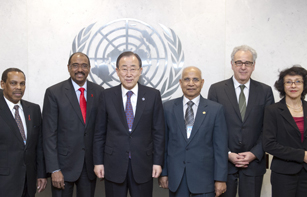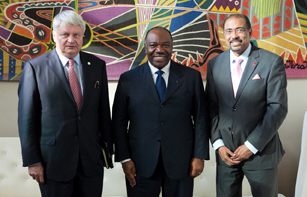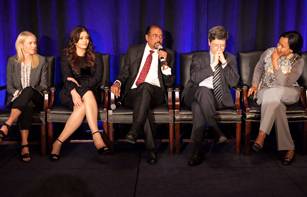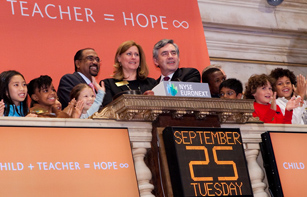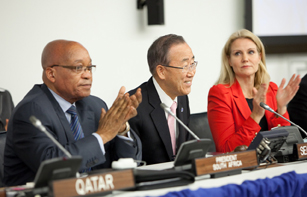
The United Nations Secretary-General Ban Ki-Moon launching the new initiative “Education First” with President Jacob Zuma of South Africa (left) and the Prime Minister of Denmark Helle Thorning-Schmidt (right). 26 September 2012. UN Headquarters, New York. Credit: UNAIDS/B. Hamilton
The United Nations Secretary-General Ban Ki-Moon launched a new initiative “Education First” to ensure that every child goes to school, receives quality education and imbibes values of global citizenship.
“Our shared goals are simple. We want children to attend primary school and to progress toward higher education that will help them to succeed in life,” said Mr Ban. “We cannot stop until every child goes to school. This is our task, this is our homework.”
Speaking on behalf of all children and young people, Chenor Bah from Sierra Leone presented a petition demanding their right for education. “Send us all to school; prepare us for the 21st century jobs, [prepare us] to be global citizens to promote tolerance and peace, comprehensive reproductive health education, and to be informed by science,” said Mr Bah. “You are tallest when you kneel to help a child,” he added.
“Education First” seeks to mobilize all partners, traditional and new, to achieve the enrolment of all children in primary education ahead of the 2015 target date for the Millennium Development Goals. The new initiative establishes that, an additional US$ 24 billion is needed annually to cover the shortfall for children out of primary and lower secondary school. “Education remains the most important investment that any state—especially in Africa and the developing world can make,” said President Jacob Zuma of South Africa.
Our shared goals are simple. We want children to attend primary school and to progress toward higher education that will help them to succeed in life
United Nations Secretary-General Ban Ki-Moon
Moderating the session, the United Nations Special Envoy for Global Education Gordon Brown called on the global community to invest fully in education. “We have to give voice and opportunity to young people,” he said.
More than US$ 1.5 billion was pledged during the event by private sector partners including US$ 1 billion by Western Union Foundation and US$ 500 million by MasterCard foundation.
“When you run a country you worry about a lot of statistics—inflation, unemployment, gross product etc.—but the one statistic that I worry most about is how our schooling fares compared to other countries,” said Julia Gillard, Prime Minister of Australia. “The success of our 15 year old children in education determines how far our economy will go and how fair as a nation we will be,” she added while supporting the initiative.

Moderating the session, the United Nations Special Envoy for Global Education Gordon Brown called on the global community to invest fully in education. Credit: UNAIDS/B. Hamilton
Highlighting the key role that teachers play in the children’s education, Irina Bokova Director-General of UNESCO noted that, “We need a new deal for teachers. We are short of 1.7 billion teachers,” she said. “We must put teachers first—they are the backbone of our society,” added Ms Bokova.
“We need to look beyond inputs and invest in school system to achieve better learning outcomes,” said Dr Jim Kim, President of World Bank. “Countries must invest in health and facilitate the access to school to make education work.”
In an op-ed written for the Huffington Post in support of the initiative, UNAIDS Executive Director Michel Sidibé wrote, “Education First is the blueprint for a brighter future, but it won’t succeed without steadfast commitment from all sectors of society, including governments and funders, as well as students and families. And success will require resources as well as good will. We now have an historical opportunity to end one of the greatest threats to humanity of our lifetime. Ending AIDS is possible—and education is the key to success.”
We now have an historical opportunity to end one of the greatest threats to humanity of our lifetime. Ending AIDS is possible—and education is the key to success
UNAIDS Executive Director Michel Sidibé
UNAIDS helped produce the “Education First” strategy document. The illustrations in the strategy were developed by Sujean Rim, the UNAIDS artist-in-residence. “Education is the best gift I have received and I am happy to be able to support this initiative,” Ms Rim said. “Children everywhere need the opportunity and the skills to express themselves through art, science and sport.”
Today, nearly 61 million children do not have access to primary education, 52% of them are girls. An additional 71 million children eligible for lower secondary education are not receiving post-primary education. Children in conflict-affected countries account for 42% of children out-of-school. Other barriers to school enrolment and completion include unaffordable costs, gender discrimination, child labour and lack of infrastructures. The new strategy also highlights that children orphaned by AIDS and other causes need focused care and protection, as do those subjected to child labour and exploitation.




